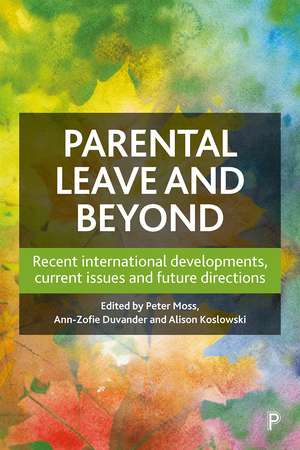Parental Leave and Beyond: Recent International Developments, Current Issues and Future Directions
Editat de Peter Moss, Ann-Zofie Duvander, Alison Koslowskien Limba Engleză Hardback – 16 apr 2019
This volume brings together contributors from nineteen countries across Europe, Asia, and the Americas to provide international perspectives on paid parental leave. The first section looks at recent developments in leave policy in eight countries, from Poland to China, paying particular attention to the politics of leave policy, including what drives and impedes change. The second section examines a number of current issues in leave policy, including flexibility in policy design, gender equality including fathers’ usage, and relationships between leave and related policy fields. The final section looks ahead to possible future directions for leave policy.
Preț: 889.61 lei
Preț vechi: 1155.35 lei
-23% Nou
Puncte Express: 1334
Preț estimativ în valută:
170.25€ • 175.88$ • 141.69£
170.25€ • 175.88$ • 141.69£
Carte tipărită la comandă
Livrare economică 25 martie-08 aprilie
Preluare comenzi: 021 569.72.76
Specificații
ISBN-13: 9781447338772
ISBN-10: 1447338774
Pagini: 336
Dimensiuni: 159 x 235 x 25 mm
Greutate: 0.68 kg
Editura: Bristol University Press
Colecția Policy Press
ISBN-10: 1447338774
Pagini: 336
Dimensiuni: 159 x 235 x 25 mm
Greutate: 0.68 kg
Editura: Bristol University Press
Colecția Policy Press
Notă biografică
Peter Moss is Emeritus Professor of Early Childhood Provision at UCL institute of Education, University College London, and co-founder of the international Network on Leave Policies and Research. Ann-Zofie Duvander is Professor of Demography at the Department of Sociology at Stockholm University and one of the coordinators of International Network on Leave Policies and Research. Alison Koslowski is Professor of Social Policy and Research Methods at the University of Edinburgh, and co-editor of the annual International Review on Leave Policies and Related Research.
Recenzii
“This is the finest collection on the topic of parental leave and related concepts available, provoking us to think beyond the realm of current policies and to construct more equitable and effective policies.”
